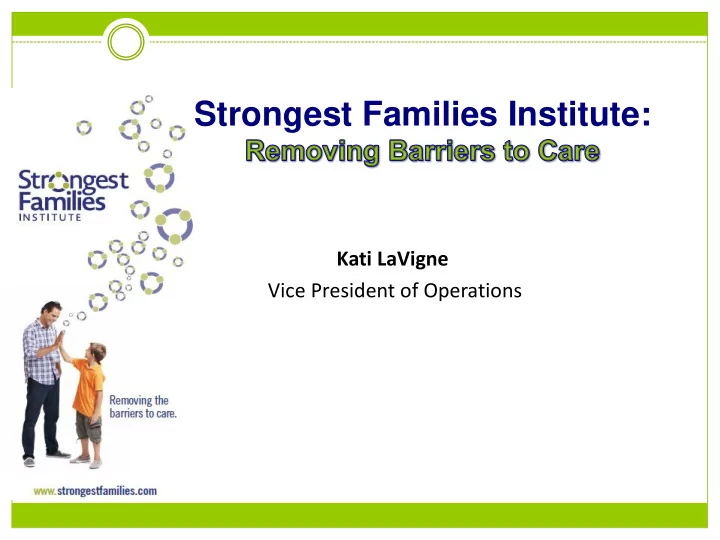

Strongest Families Institute: Kati LaVigne Vice President of Operations
Pediatric Mental Health Very common with early symptom onset • Ontario, Canada- 20% have a diagnosable disorder ( Offord et al.,1987 ) • United States of America - 1 in 5 children ( Centre for Disease Control, 2013 ) • World Health Report- 10 to 20% ( WHO, 2001 ) o 1-16 year olds: India 13%; Ethiopia 18%; Switzerland 22% o 12-15 year olds: Japan 15%; Germany 21% Untreated conditions exacerbate overtime • More difficult to manage Inflict a heavy burden on the child, family and society • • Lead to co-morbid conditions, tracking into adulthood (Costello et al., 2005; Kessler et al., 2005)
Issue: Barriers to access timely care Current System • Limited availability of evidence-based, early intervention services for children and youth • System unable to serve all who need help wait lists Barriers families can encounter: • Day time appointments for 16 weeks can be difficult to commit to • Travel burden inconvenient for 16 weekly sessions • Financial burden with travel or time off work, especially rural/remote • Time from school; child resistance • Stigma associated with receiving mental health services • Long waitlists, problems become worse over time Result in : High attrition rates untreated conditions track into adulthood and more difficult to manage
Access solution: Removes Barriers to Care Strongest Families Institute: Not-for-profit, Bilingual (EN & FR) Evidence-based, Distance Education Model (S kill-based learning) Programs target Behaviour, Anxiety, Bedwetting problems Delivered to families in comfort and privacy of their own home Weekly coaching phone sessions at convenient times Days, evenings, nights Receive materials (handbooks or web-interface) Skill demonstration media Removes barriers to care No travel, no financial burden, no missed work/school, no stigma o Compliments existing system: SFI sends letter updates to referring source
Evidence-based Programs Programs and mode of delivery Handbooks/DVDs or Smart web-site English & French Coaching modes- 1:1 or group based Group- 10clients: 1 coach Anxiety (6-17 yrs): Relaxation skills & exposure Performance, social, specific phobia, generalized, separation Behavior (3-12 yrs): Parenting Oppositional defiance, ADHD, conduct Night-time Bedwetting (5-12 yrs): Urine alarm ~ Intelligent Research and Intervention Software (IRIS) technology at the core of operations
How does Strongest Families work? Self-help design with coach facilitation One skill-based session per week (11-12 skills, total of 16) Practices implementation of skill daily – matched to address problems Highly trained telephone Coaches Perform protocolized telephone sessions (problem solve/encourage families) Quality assurance monitoring to ensure program fidelity Calls are recorded and monitored (2-5% recorded calls scored) Weekly caseload review by coach supervisor Customize the intervention to meet family needs Family-centred approach (child special needs; family challenges) Care plan based on intake results, risk management protocols
Outcomes Outcomes are consistently measured & reported Validated tool pre/post intervention (Brief Child & Family Phone Interview - BCFPI) Service delivery (Publication in preparation) Service results strong > 85% child outcome success Strong impact on academic progress, bullying (72%), victimization (68%) Strong impacts on family functioning and parental mood <10% attrition Other facts: 32% families <$30k annual income; 63% single parents Canadian First Nations children and youth: strong outcomes at 96% Past 1.5 years rise in LGBTQ2+ youth referrals: strong outcomes June 8, 2009
Behaviour: Parents Empowering Kids (3-12) Positive Parenting: COPE (adapted) (Cunningham et al., 1995) Increase pro-social/Decrease antisocial Emotional regulation Parents Empowering Kids Strengthen family relationship
Anxiety: Chase Worries Away (6-11) Parent & Child/Youth component - Relaxation skills - Changing thoughts - Imagery - Gradual exposure Story of two junior high students with high anxiety who learn skills then become superheroes (comic book style)
Mobile Responsive Examples June 8, 2009
Anxiety Program (Alberta)
Anxiety Program Outcomes Depression among 11-17yo (351 cases) 38% presented with significant depression 96% resolved at least one of Anxiety OR Depression 87% resolved BOTH Anxiety and Depression 84% increased school attendance – those that weren’t attending regularly are now attending classes on a regular basis Indirect impact on socialization June 8, 2009
Referral Process Referral process varies based on where the child/youth resides and funding availability in their area. Inclusion criteria: Cases that fit the age parameters of our programs Must have Significant problems (>6 mos) PLUS Significant impairment Includes complexities (e.g., comorbidities, complex family situations, past abuse/neglect, some involvement with authorities) SFI contacts within 24-48 business hours to pre-screen SFI will follow-up at various time points (day, evening, night) at all contact numbers provided, and leave messages If we are unable to reach families, a ‘difficulty contacting’ letter is sent and referring source copied (with permissions)
Exclusion Criteria Imminent risk to harm self and/or others Active psychosis Current significant involvement in the Criminal Justice System with severe presenting issues Active youth substance abuse issues/dependency June 8, 2009
Awards Received www.strongestfamilies.com Governor General Innovation Award, 2017 Ernest C. Manning Encana Principal Award, 2013 Mental Health Commission of Canada, 2012 Progress Magazine Health Innovation Award, 2012 June 8, 2009
Expanding services to those in need Canada Newfoundland & Labrador: Provincial (Dept. of Health) Nova Scotia: Provincial (Dept. of Health & Wellness) PEI: Provincial (Health PEI) New Brunswick: Provincial (Multiple Dept. collaborative) Ontario: Peel Children’s Centre, Woodview Children’s, New Path/ Kinark/Le Cle, Simcoe-Muskoska LHIN, Kingston MFRC Alberta: Calgary Zone & Edmonton zone National: Military Family Services Other Interest: • New Zealand: National e-health <Launching soon country-wide> June 8, 2009
Conclusion Removing Barriers to Care No travel, no time from work/school, no cost, no stigma A cost-effective, timely access solution Highly effective, highly accepted with low attrition Convenient, accessible and scalable Timely- intervening early before problems become worse Providing outreach to families when & where they need it Especially those in rural and under-resourced regions Harnesses advantages of technology Enhance the client care experience • Continue to respond to the needs of families, involving youth feedback
Kati LaVigne , Vice President of Operations klavigne@strongestfamilies.com www.strongestfamilies.com
Recommend
More recommend